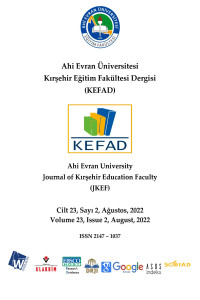Çocuk Kütüphanelerindeki Kitapların Çocukların Epistemolojik Gelişimleri Açısından İncelenmesi Gaziantep Çocuk Kütüphanesi Örneği
Öz
Bu çalışmanın amacı, çocukların epistemolojik gelişimlerini etkileme gücüne sahip olan çocuk kitaplarındaki metinlerin bilgi türleri yönünden incelenmesidir. Araştırmanın veri setini Gaziantep Büyükşehir Belediyesi Güvenevler Çocuk Kütüphanesinde bulunan, 2015-2020 yılları arasında Türkçe basılmış ve/veya Türkçeye çevrilmiş 30 çocuk kitabı oluşturmaktadır. Araştırma, nitel bir araştırma olup veriler doküman incelemesi tekniğiyle toplanmıştır. Çalışmaya dâhil edilen bu kitaplar araştırmacı tarafından ilgili alan yazın taranarak ve başka alanlarda yapılan benzer çalışmaların veri toplama araçları incelenerek geliştirilen “Çocuk Kitaplarındaki Bilgi Cümlelerini Bilgi Türlerine Göre Değerlendirme Formu” aracılığıyla toplanmıştır. Çocuk Kitaplarındaki Bilgi Cümlelerini Bilgi Türlerine Göre Değerlendirme Formunda bilgi cümleleri kitaplardaki sıklık düzeyleriyle birlikte ve bu cümlelerin kitapta geçtiği sayfa numarasına göre kaydedilmiştir. Araştırma kapsamında elde edilen verilerin analizi ve yorumlanmasında betimsel analiz kullanılmış; verilerin çözümlenmesinde frekans (f) ve yüzde (%)’den yararlanılmıştır. Araştırma sonucunda, incelenen çocuk kitaplarının tamamında bilgi türlerine yer verildiği görülmüştür. Bu kitaplar, bilgi türü dağılımına göre değerlendirildiğine en çok gündelik bilgi ve bilimsel bilginin, en az ise felsefi ve dini bilginin kullanıldığı tespit edilmiştir. Araştırmanın sonuçları doğrultusunda, epistemolojik gelişimin ele alındığı çok boyutlu çalışmaların yürütülmesi; çocuk edebiyatı eserlerini üreten yazarlara ve bu eserleri yayımlayan yayınevlerine çocukların epistemolojik gelişimlerini göz önünde bulundurarak eserler üretmeleri önerilmektedir.
Anahtar Kelimeler
Kaynakça
- Dilidüzgün, S. (2005, 11-12 Kasım). Türkiye’de çocuk edebiyatına bakışlar ve çağdaş çocuk edebiyatı [Bildiri]. Çocuk ve İlkgençlik Edebiyatı Kurultayı Maltepe Üniversitesi, İstanbul, Türkiye.
- Direk, N. (2006). Filozof çocuk: Çocuklarla felsefe konuşmaları. Pan Yayıncılık.
- Fırat, H. (2019). Çizgi filmlerde çocuk gerçekliği: Niloya örneği. Uluslararası Türkçe Edebiyat Kültür Eğitim (TEKE) Dergisi, 8(2), 1007-1033. https://dergipark.org.tr/tr/pub/teke/issue/46075/580118
- Gönen, M. (1998). 99 Soruda Çocuk Edebiyatı. M. R. Şirin (Ed.), Çocuk Edebiyatı Kültürü (s. 43-46) içinde. Çocuk Vakfı Yayınları.
- Gönen, M., Katrancı, M., Uygun, M., & Uçuş, Ş. (2011). İlköğretim birinci kademe öğrencilerine yönelik çocuk kitaplarının, içerik, resimleme ve fiziksel özellikleri açısından incelenmesi. Eğitim ve Bilim, 36(160), 250-265.
An Assessment of Books’ Contents in Children's Libraries by Children's Epistemological Development: Children's Library in Gazıantep
Öz
This study aimed to examine the texts in children's books regarding epistemological development and information types. The research data consisted of 30 children's books in Gaziantep Metropolitan Municipality Güvenevler Children's Library, published in Turkish or translated into Turkish between 2015-2020. In this qualitative research, the data were collected using the document analysis technique. The researcher developed the "Assessment Form for Information Types in Children's Books" and chose the books following a review of the literature and data collection tools of similar studies in other fields. There are six information types in the form: everyday information, technical information, aesthetic information, scientific information, religious information, and philosophical information. The information sentences were noted in the assessment form with their usage frequency and page numbers in the books. The data were analyzed using descriptive statistics, and frequency (f) and percentage (%) were measured accordingly. The study results revealed that everyday and scientific information types were the most commonly used types, and philosophical and religious information was the least used types. In the literature, there are several studies on illustrated children's books. Researchers have evaluated different aspects of those books by specific criteria, and they primarily focused on those books’ effects on education. However, no study in the literature assessed them by information types. Thus, the study findings can guide future researchers and practitioners to carry out multidimensional studies on epistemological development. Besides, it is recommended that the authors and publishers produce and publish children's literature works by considering children's epistemological development.
Anahtar Kelimeler
Kaynakça
- Dilidüzgün, S. (2005, 11-12 Kasım). Türkiye’de çocuk edebiyatına bakışlar ve çağdaş çocuk edebiyatı [Bildiri]. Çocuk ve İlkgençlik Edebiyatı Kurultayı Maltepe Üniversitesi, İstanbul, Türkiye.
- Direk, N. (2006). Filozof çocuk: Çocuklarla felsefe konuşmaları. Pan Yayıncılık.
- Fırat, H. (2019). Çizgi filmlerde çocuk gerçekliği: Niloya örneği. Uluslararası Türkçe Edebiyat Kültür Eğitim (TEKE) Dergisi, 8(2), 1007-1033. https://dergipark.org.tr/tr/pub/teke/issue/46075/580118
- Gönen, M. (1998). 99 Soruda Çocuk Edebiyatı. M. R. Şirin (Ed.), Çocuk Edebiyatı Kültürü (s. 43-46) içinde. Çocuk Vakfı Yayınları.
- Gönen, M., Katrancı, M., Uygun, M., & Uçuş, Ş. (2011). İlköğretim birinci kademe öğrencilerine yönelik çocuk kitaplarının, içerik, resimleme ve fiziksel özellikleri açısından incelenmesi. Eğitim ve Bilim, 36(160), 250-265.
Ayrıntılar
| Birincil Dil | Türkçe |
|---|---|
| Konular | Alan Eğitimleri |
| Bölüm | Araştırma Makaleleri |
| Yazarlar | |
| Yayımlanma Tarihi | 31 Ağustos 2022 |
| Yayımlandığı Sayı | Yıl 2022 Cilt: 23 Sayı: 2 |


